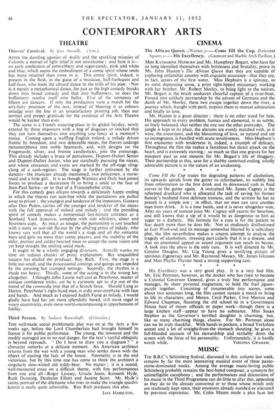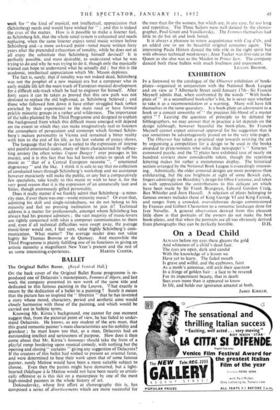, MUSIC THE B.B.C's Schonberg festival, discussed in this column
last week, remains by far the most interesting musical event of these panto- mime-dominated weeks. Among the average music-loving public Schonberg probably remains the best-hated composer, a synonym for unintelligible cacophony.; and the performances and discussions of his music in the Third Programme can do little to alter this, appealing as they do to the already converted or to those whose minds only are studiously kept open, their emotions already numbed or alienated by previous experience. Mr. Colin Mason made a plea hcre last
week for " the kind of musical, not intellectual, appreciation that (Schonberg) needs and would have wished for " ; ,and this is indeed the crux of the matter. How is it possible to make a listener feel, as Schonberg felt, that the whole tonal system is exhausted and needs replacing, when the same listener enjoys tonal music written before Schonberg and—a more awkward point—tonal music written forty years after the pretended exhaustion of tonality, while he does not at all enjoy the substitute that Schonberg himself devised? It is perfectly possible, and most desirable, to undeistand what he was trying to do and why he was trying to do it, though only the musically trained can hope to understand what he actually did ; but this is the academic, intellectual appreciation which Mr. Mason deplores.
The fact is, surely, that if tonality was not indeed dead, Schonberg was not the prophet of a new musical era but a composer who in early middle life left the main track of European musical development for a difficult side-track which he had to engineer for himself. After forty years it can be taken as proved that this new path was not destined to replace the old high-road, as Schonberg believed ; and those who followed him down it have either struggled back (often enriched by their experience) to the main road or have formed prickly minority groups in a rather arid wilderness. The importance of the talks planned by the Third Programme and designed to explain the background from which this difficult music emerged will depend on the extent to which they can make imaginatively real to listeners the atmosphere of persecution and contempt which formed Schon- berg's mature personality in Vienna and remained a bitter reality with him to the end of his life, as his last volume of essays shows.
The language that he devised is suited to the expression of intense and painful emotional states, many of them characterised by suffoca- ting anxiety (he often writes Urgent Danger ! over passages in his music), and it is this fact that has led hostile critics to speak of his 'music as "that of a Central European neurotic ", emotional degeneracy" and the like. I think it is safe to say that no collection of conducted tours through Schonberg's workshop and no assistance however musicianly will make the public, or any but a comparatively few specialists, take kindly to this music or wish to hear it, for the very good reason that it is the expression of an unnaturally taut and bitter, tho'ugh enormously gifted personality.
Does it really matter if we frankly admit that Schonberg—a mino- rity man, if ever there was one—wrote minority music? Or even that, admiring his skill and single-mindedness, we do not belong to his minority and feel no pressing inclination to join it? Technical address is a matter for professionals, amongst whom Schonberg has always had his greatest admirers ; the vast majority of music-lovers are rightly concerned with what a composer communicates to them and, even if all technical difficulties were swept away, the average music:lover would not, I feel sure, value highly Schonberg 's com- munication. What matter? The average reader does not value highly Sir Thomas Browne or de Quincey. And meanwhile the Third Programme is plainly fulfilling one of its functions in giving an artistic minority a magnificent New Year's present and the rest of



































 Previous page
Previous page